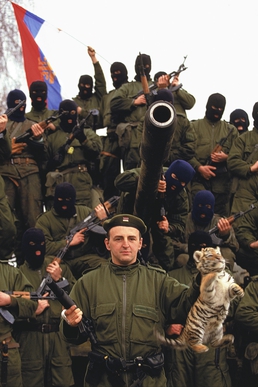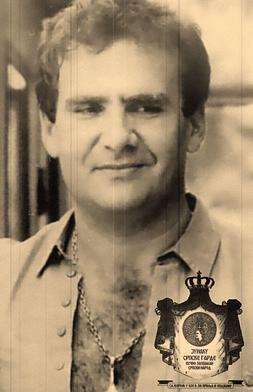
Željko Ražnatović, better known as Arkan, was a Serbian warlord, mobster and head of the Serb paramilitary force called the Serb Volunteer Guard during the Yugoslav Wars, considered one of the most feared and effective paramilitary forces during the wars. His paramilitary unit was responsible for numerous crimes in Eastern Bosnia, including murder, pillaging, rape and ethnic cleansings.

Zoran Đinđić was a Serbian politician and philosopher who served as the prime minister of Serbia from 2001 until his assassination in 2003. He was the mayor of Belgrade in 1997. Đinđić was a long-time opposition politician and held a doctorate in philosophy.

Vuk Drašković is a Serbian writer and politician. He is the co-founder and former leader of the Serbian Renewal Movement, serving as president from 1990 to 2024. He also served as the war-time Deputy Prime Minister of the Federal Republic of Yugoslavia in 1999 during the rule of Slobodan Milošević and the Minister of Foreign Affairs of both Serbia and Montenegro and Serbia from 2004 to 2007.

The Serb Volunteer Guard was a Serbian volunteer paramilitary unit founded and led by Željko Ražnatović. It fought in the Croatian War and the Bosnian War during the Yugoslav Wars, and was responsible for numerous war crimes and massacres.

Unit for Special Operations or Special Operations Unit, also known as Red Berets or Frankies, was an elite special forces police unit of Serbian State Security Directorate (RDB).

The Serbian Renewal Movement is a liberal and monarchist political party in Serbia. It was founded in 1990 by writer Vuk Drašković, who served as the party's president until 2024. Aleksandar Cvetković is the incumbent leader.

The 1991 protests in Belgrade happened on the streets of Belgrade, the capital of Serbia and Yugoslavia when a protest rally turned into a riot featuring vicious clashes between the protesters and police.
The Gospić massacre was the mass killing of 100–120 predominantly Serb civilians in Gospić, Croatia during the last two weeks of October 1991, during the Croatian War of Independence. The majority of the victims were ethnic Serbs arrested in Gospić and the nearby coastal town of Karlobag. Most of them were arrested on 16–17 October. Some of the detainees were taken to the Perušić barracks and executed in Lipova Glavica near the town, while others were shot in the Pazarište area of Gospić. The killings were ordered by the Secretary of Lika Crisis Headquarters, Tihomir Orešković, and the commander of the 118th Infantry Brigade of the Croatian National Guard, Lieutenant Colonel Mirko Norac.
The Sjeverin massacre was the massacre on 22 October 1992 of 16 Bosniak citizens of Serbia from the village of Sjeverin who had been abducted from a bus in the village of Mioče, in Bosnia. The abductees were taken to the Vilina Vlas hotel in Višegrad where they were tortured before being taken to the Drina River and executed. Members of a Serbian paramilitary unit commanded by Milan Lukić were convicted of the crime in 2002.

Serbia, as a constituent subject of the SFR Yugoslavia and later the FR Yugoslavia, was involved in the Yugoslav Wars, which took place between 1991 and 1999—the war in Slovenia, the Croatian War of Independence, the Bosnian War, and Kosovo. From 1991 to 1997, Slobodan Milošević was the President of Serbia. The International Criminal Tribunal for the former Yugoslavia (ICTY) has established that Milošević was in control of Serb forces in Bosnia and Herzegovina and Croatia during the wars which were fought there from 1991 to 1995.

The Battle of Gospić was fought in the environs of Gospić, Croatia, from 29 August until 22 September 1991 during the Croatian War of Independence. The battle pitted the Yugoslav People's Army (JNA), stationed in five barracks in the town, and paramilitary elements of the Serbian Guard against the Croatian National Guard (ZNG), police forces based in Gospić and police reinforcements from elsewhere in Croatia. Fighting in the eastern districts of Gospić, controlled by JNA forces with supporting artillery, was largely static but the balance shifted in favor of the Croatian forces following the capture of several JNA depots and barracks on 14 September. The remaining barracks were captured by 20 September leading to the expulsion of the JNA and Serbian Guard forces from the town.

The Democratic Movement of Serbia or DEPOS was a Serbian political coalition that existed between 1992 and 1994.
General elections were held in Serbia, a constituent federal unit of SFR Yugoslavia, in December 1990 to elect the president of Serbia and members of the National Assembly. The presidential election and the first round of the parliamentary elections were held on 9 December, with the second round of the parliamentary elections taking place on 23 December. The elections were scheduled after the ratification of a new constitution on 28 September, which was approved by voters in a referendum held in July. These were Serbia's first multi-party elections, and the parliamentary election was the only one to be held using a first-past-the-post, two-round voting system with single-member constituencies; all future elections used proportional representation.

Đorđe "Giška" Božović was a Serbian criminal and paramilitary commander during the Yugoslav Wars.

Milorad Ekmečić was a Yugoslav and Serbian historian. During World War II he became a member of the Yugoslav Partisans after the fascist Ustaše perpetrated the Prebilovci massacre, in which 78 members of his family were killed, including his father. He studied at the University of Zagreb and went on to be a professor at the University of Sarajevo, and later at the University of Belgrade. He was a member of several Yugoslav academies of sciences and arts, the author of more than a dozen historical books, and received several significant national awards. Ekmečić authored several important works in socialist Yugoslavia, including his contribution to the acclaimed History of Yugoslavia published in English in 1974, and Stvaranje Jugoslavije 1790–1918 [Creation of Yugoslavia 1790–1918] in 1989. According to his obituary in Vreme news magazine, Ekmečić was considered "a prominent representative of Serbian critical historiography".
Pogledi was a Serbia-based magazine devoted to politics and history, published biweekly. Pogledi was the first opposition magazine in communist Yugoslavia. In total, 268 issues were published.
Ranko Rubežić was a Serbian gangster and criminal.

Iso Lero, known by his nickname Džamba, was a Yugoslavian gangster based in Belgrade, Serbia. He was called "the Don of Dorćol". He disappeared on 23 September 1992 after having received a beating from several members of the Serb Volunteer Guard paramilitary near the Beograđanka building.
Milan Božić is an academic, administrator, and politician in Serbia. He was a cabinet minister in the Yugoslavian government in 1999, has served in the assemblies of Yugoslavia and Serbia, and at one time was the acting mayor of Belgrade. He now serves as chair of the supervisory board of Telekom Srbija. A member of the Serbian Renewal Movement for most of his time as an elected official, Božić is now a member of the Serbian Progressive Party.

Danica Drašković is a Serbian lawyer, writer, and politician. She is the wife of Vuk Drašković, the co-founder and former president of the Serbian Renewal Movement and former minister of foreign affairs of Serbia.














